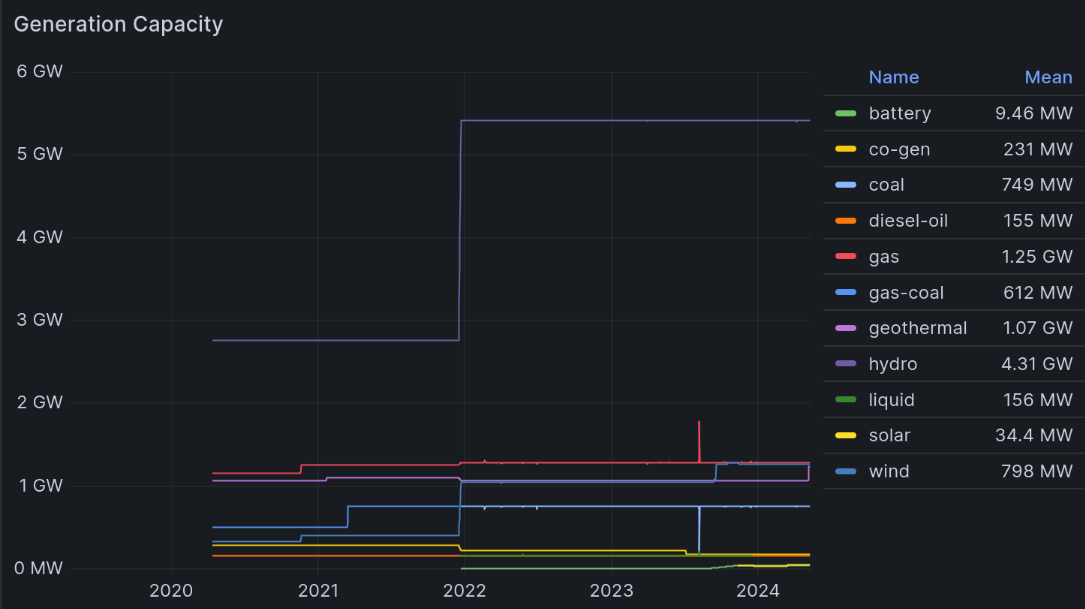The national electricity grid operator is warning of possible insufficient power generation to meet households’ demand on Friday.
Transpower has issued a notice saying there was a risk that power generation and reserves would not meet demand between 7.30am-8.30am.
It said if power generators could not provide enough electricity, Transpower would manage demand to avoid a grid emergency.
“The system operator may instruct the grid owner to disconnect feeders without further notice to connected parties,” it said.
MetService has forecast temperatures to plunge overnight, with Christchurch set to fall to -4 degrees Celsius
I tought temperatures below 0°C are common in NZ 🤔
Common enough; but I wonder if this is a symptom of new generation not keeping up with attempts to reduce emissions. Less coal/gas power generation & less wood-fired heating combining with a cold snap.
But the intent of a grid notice like that is to encourage generators to turn on more supply I think - its only a grid emergency notice that indicates supply isn’t meeting demand.
The other thing that’ll happen is where areas have ripple control they’ll turn off hot water & street lights & whatnot to reduce demand as well.
Common enough; but I wonder if this is a symptom of new generation not keeping up with attempts to reduce emissions. Less coal/gas power generation & less wood-fired heating combining with a cold snap.
Yeah, I guess coal/gas power.still needed during the colder months.
“We will work with lines companies to, as a last resort, switch off power to locations for a short period of time.”
Asked if she could guarantee this wouldn’t happen during the colder months, Bramley said no.
“No power system can absolutely guarantee supply but as we’ve seen today, when industry comes together we can make sure there is enough in the system.”
Or storage for our more intermittent renewables such as wind & solar. Pumped Hydro would have been useful early this morning for instance (and is what lots of places in the rest of the world are doing).
It’s unlikely that a temp of -4C in Christchurch is the issue. Single digit negatives are normal across much of the country.
It may be that forecasts have cold temps across much of the country, so instead of it peaking in one area it might be everywhere. Or it might be the location of the generation that can’t get to where it’s forecast to be needed.
The article doesn’t help explain it. Hydro lakes aren’t particularly low. Is peak generation expected to be the highest ever? It’s not mentioned.
This is the kind of situation that variable supply rates for residential households would help. There are many people across the country running solar with batteries, imagine a system where you connect it to a server to get a spot price and have it supply electricity back to the grid at times of high spot prices (that would of course mean providers would have to do variable rates). This one hour period of a slight shortfall could probably easily be supplied by the battery capacity installed in residential homes.
Thank you for the information, yes it is a bit confusing for me, because the article doesn’t explain about low water levels.
Yeah, the article doesn’t say much at all. Water levels seem ok, so hard to know what the issue might be.
I mean Taupo lake looks a bit low?
The graph is in available GWh, which means it goes all the way to 0 before it stops being able to provide electricity. It’s just at the low end of normal but we are coming out of summer so that’s not surprising.
None of the lakes look like they can’t produce at maximum for an hour to cover the shortfall. So I’d guess hydro isn’t the problem. Hard to say why tomorrow is an issue though. Perhaps this snuck up on them, getting a fossil fuel power station up and running takes time, so maybe they could have covered it but weren’t prepared?
I tried to find historical data on peak load but could only find live data on current load. So I’m all out of guesses!
Says in the article that some generators are down for required maintenance “ahead of the winter”. Doesn’t specify which type of generation or whether the maintenance needs to be carried out specifically to prepare for winter conditions though.
It would be nice to have a bit more detail, maybe justification for why maintenance of electrical plant can’t be done at times of the year when demand is lower.
When I first posted this article, it was about 100 words long and I quoted most of it in the body if my post. It seems they fleshed it out significantly! Nice to have an answer!
In the article they mention this cold weather is earlier than normal, they have the plants shut down ahead of the super cold weather and got caught out by the cold coming so early.
I believe a portion of it is quite a low forecast for wind generation coinciding pretty closely with the morning peak.
The peak-trough consumption difference seems to be about 2GW, and wind generation averages about 400MW but can hit 900MW
If you wanna poke around with some historical data yourself, I scrape a lot of it for my own curiosity, and have opened up my dashboard
The original article has been fleshed out and they now say it’s because a lot of generation is offline for maintenance ahead of winter, and this cold weather is earlier than expected.
If you wanna poke around with some historical data yourself, I scrape a lot of it for my own curiosity, and have opened up my dashboard
Oh wow heaps of cool stuff there! What happened to hydro in 2021/2022? Capacity doubled overnight, is this just a measuring issue?

deleted by creator
Looks like the article has been fleshed out a lot more. They have a lot of the plants offline ahead of winter for maintenance to prepare for winter, but looks like they got caught out by unseasonably cold weather.
Odd that this happens in the morning, I was under the impression peak demand was early evening when everyone gets home?
This page (down the page a bit) shows you’re right. But the second highest is the morning peak, and that graph is averages. In this case it’s an unseasonably cold morning across NZ so for this day in particular they are worried about everyone using their heating at the same time, their forecasts are probably for the morning to have a higher peak on this day in particular.
I wonder if they’re forecasting less generation in the morning, perhaps no wind?
The article got updated to say that capacity is down at the moment because of pre-winter maintenance, and the unseasonably cold weather means they weren’t prepared for this.
That makes sense actually.
Be sure to sleep in tomorrow if you can!
This is what happens when you don’t have straight power.




